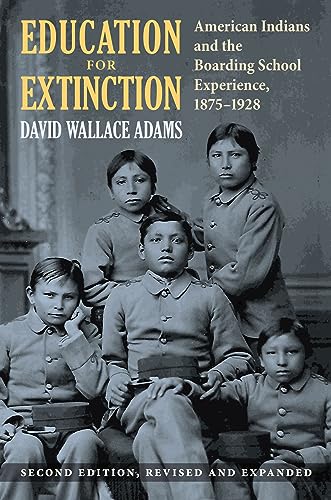Education for Extinction
American Indians and the Boarding School Experience, 1875-1928
David Wallace Adams
BOOK REVIEW

Education for Extinction: American Indians and the Boarding School Experience, 1875-1928 is not merely a historical exploration; it's a piercing examination of systemic oppression that resonates through the ages. David Wallace Adams weaves an intricate narrative that envelops you in the dark corners of American history, revealing the harrowing boarding school experience that sought to erase the identity of Native American children.
In stark contrast to the romanticism often associated with the American frontier, Adams drags you through the desolate nightmare that these children endured. The intention behind these boarding schools was clear: to assimilate Native Americans into a Eurocentric society, stripping them of their languages, cultures, and ultimately, their very essence. As you delve into the pages, the narrative feels almost visceral-their voices echoing through time, compelling you to confront this injustice.
Adams doesn't simply present a chronology; he evokes a raw emotional response. Through heart-wrenching testimonials, we hear the suppressed cries of children torn from their families-a tragedy that reverberates within you, igniting an anger so palpable that it demands your attention. The personal stories shared within this work serve to humanize an otherwise abstract atrocity, transforming numbers and dates into flesh-and-blood realities. The horror of the boarding school experience, depicted with both empathy and critical insight, leaves an indelible mark, demanding readers not just to bear witness but to act.
The significance of this book cannot be overstated in today's sociopolitical climate. As the Black Lives Matter movement and discussions about systemic racism gain momentum, Education for Extinction serves as a chilling reminder of the historical roots of oppression in America. It urges you to reflect on how past traumas inform contemporary struggles for identity and equity. It unveils how the forced disappearance of culture can manifest into lifelong impacts on communities, emphasizing the need for dialogue and reparative justice.
Though some critics argue that Adams' focus on trauma can sometimes overshadow resilience, it's important to recognize that the raw portrayal of suffering is a necessary confrontation. Healing cannot begin without acknowledging the depths of pain endured. The author challenges readers to sift through uncomfortable truths in search of understanding, asserting that the legacy of these schools still lingers today in the very fabric of American society. The call for awareness is deafening.
Readers have reacted passionately; some praise Adams for his meticulous research and the powerful emotional weight of his narrative, while others express discomfort at the stark realities faced by Indigenous peoples. This discourse reflects the complexity of engaging with uncomfortable histories-some recoil, while others are inspired to seek justice. It's this critical engagement that ultimately breathes life into discussions about reparations and the ongoing fight for recognition.
As you navigate through Education for Extinction, you find yourself grappling with profound questions: What does it mean to heal from a history that still haunts you? How can we honor the resilience of those who came before us while condemning the injustices they faced? Can we rise from this history, not as passive observers, but as active participants in reshaping the narrative? 🌍
There's an urgency to grasp the realities presented in this work-an imperative that mixes outrage and hope. History isn't just something to read; it's a living entity demanding reckoning. By shedding light on the experiences of American Indian children from 1875 to 1928, Adams ignites a powerful flame in the hearts of readers-one that can fuel conversations, ignite change, and foster a deeper understanding of identity.
This isn't just a book; it's a clarion call for awareness, empathy, and action. History inevitably shapes who we are, but understanding it can empower us to advocate for a more just future. Will you answer that call? 📣 Let the pages of Education for Extinction guide you toward a reckoning, a revolution of thought that is long overdue.
📖 Education for Extinction: American Indians and the Boarding School Experience, 1875-1928
✍ by David Wallace Adams
🧾 472 pages
2020
#education #extinction #american #indians #boarding #school #experience #18751928 #david #wallace #adams #DavidWallaceAdams